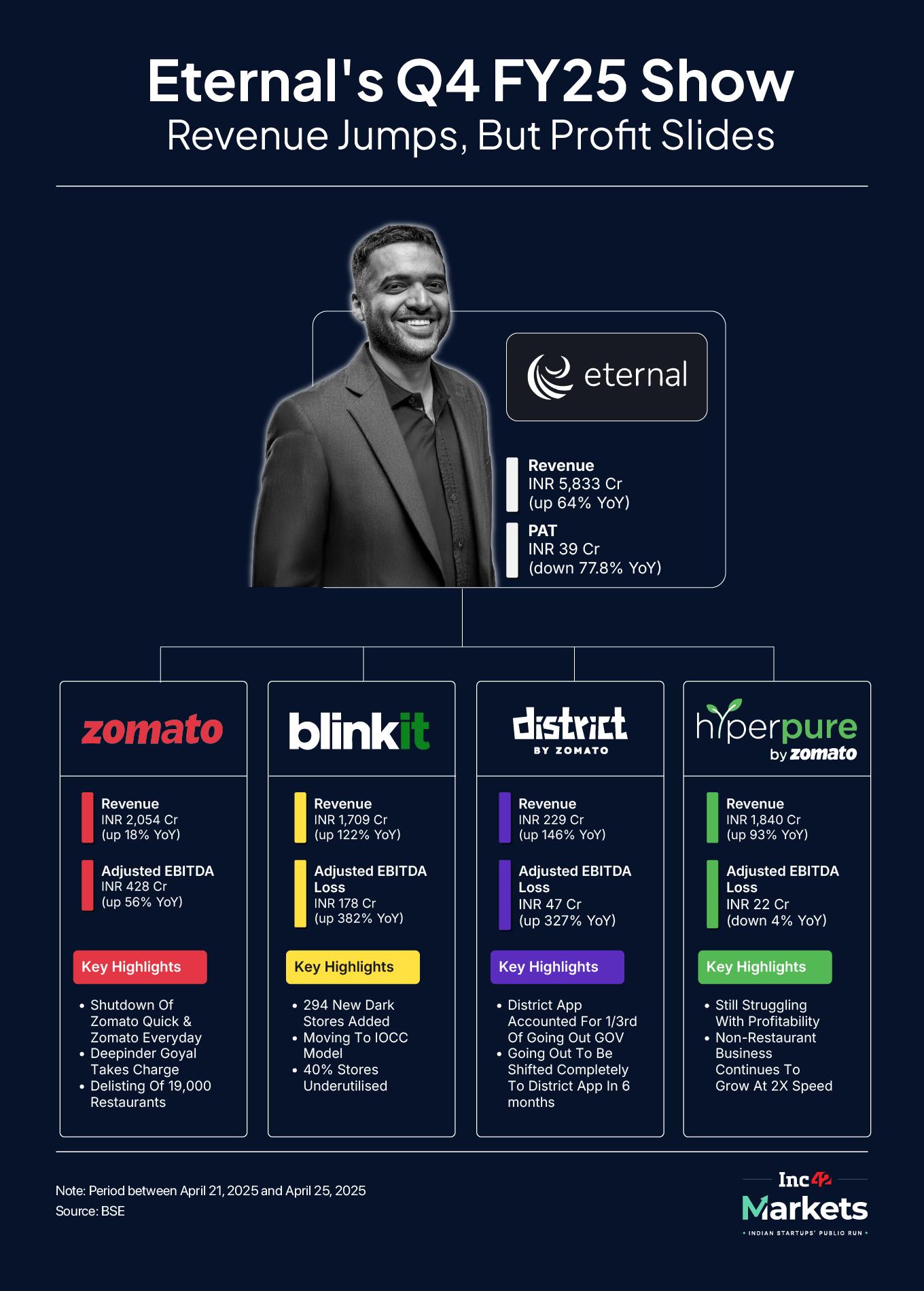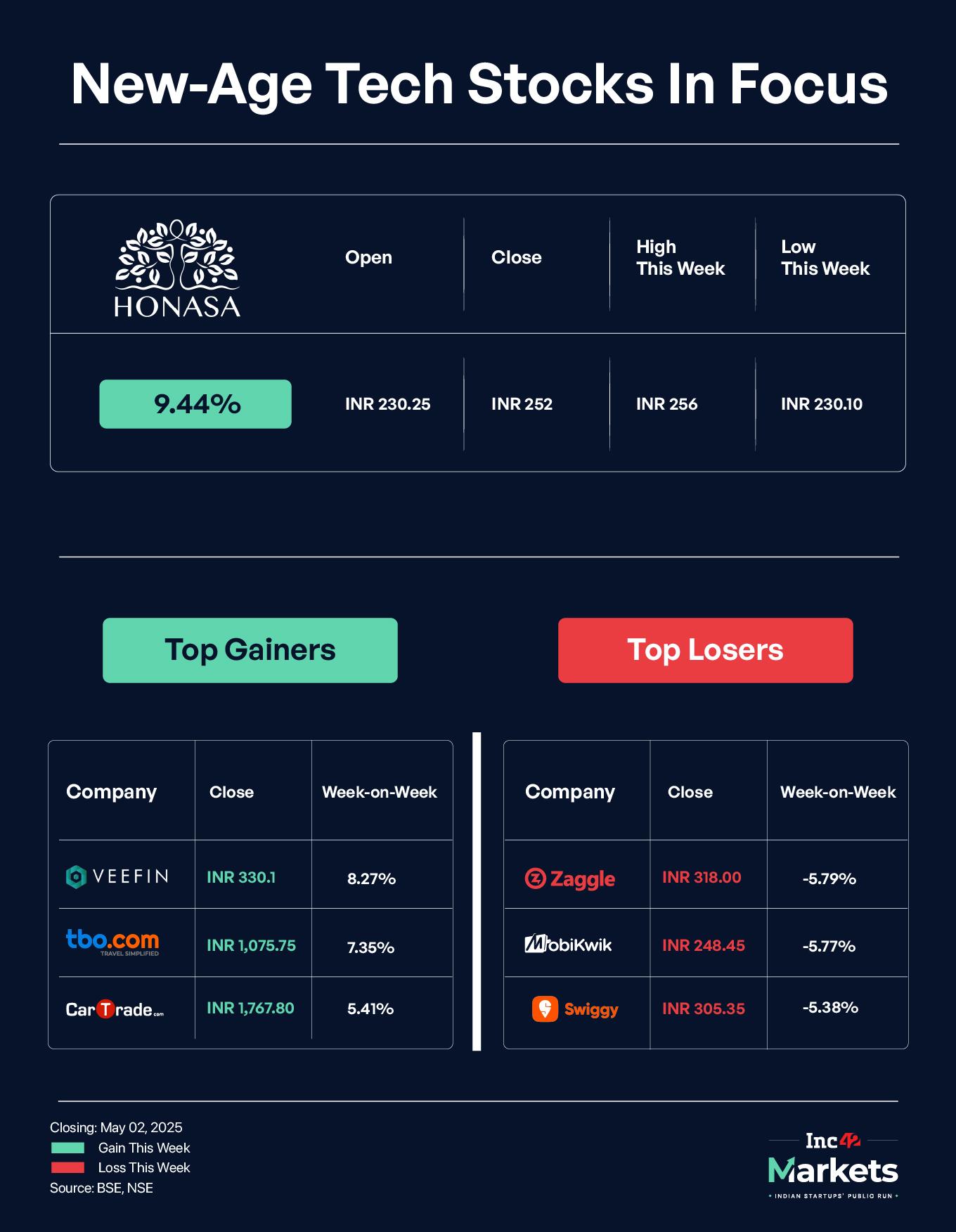Zomato or Eternal — what’s in a name, indeed? Even with a new name, the Deepinder Goyal-led company is dealing with the same old problem. Can food delivery show growth and profits at the same time?
Let’s break down , and the state of food delivery and quick commerce, and asses whether concerns of a food delivery ceiling are warranted.
Our focus this week is largely on Zomato and the food delivery business because despite growing in scale, the Blinkit piece is more or less at the same position on the board as it was one year ago, even though the game itself has gotten bigger.
However, we would be focussing on Blinkit towards the end and how it is influencing the course of Eternal’s Hyperpure business as well.
The Eternal Food Delivery ConundrumThe perennial argument is that food delivery is an underpenetrated segment, but given the slow customer addition, it seems that this remains so for a reason. But Zomato continues to believe that it can pull more users from the untapped base and from rivals in the future.
The numbers for Q4 FY25 show that new customer addition has not exactly set new benchmarks in the past year. Gross order value grew 16% YoY (-1% QoQ due to seasonality). It could have been higher by approximately 2% but for the company delisting approximately 19,000 restaurants.
Average monthly transacting users grew by 10% YoY from 19 Mn to 20.9 Mn, but under 2% quarter-on-quarter.
For further clarity, Zomato’s MTU base grew by 4 Lakh in the quarter, similar to the numbers seen in the previous three quarters. The monthly net additions have largely remained flat for the full fiscal year, but whether this reflects a sector-wide chill will be clearer by this time next week when Swiggy also makes its Q4 disclosures.
As for food delivery hitting a growth wall — this question was on everyone’s minds . Eternal’s overall profits plunged 77.8% to INR 39 Cr in Q4 FY25 from INR 175 Cr in the year-ago period and INR 59 Cr in the previous quarter, as reported this week.
JM Financial trimmed GOV estimates for Zomato (food delivery) by 1-2% over FY26-27 on the back of broader headwinds for discretionary spending in the country.
For arch rival Swiggy, in Q3 FY25, the losses widened to from INR 574 Cr a year earlier. And while Q4 may not end the losses, we expect very sharp commentary around unit economics by Swiggy come May 9 — watch out for our coverage of that in the coming week.
Zomato Swerves Away From Quick Food DeliveryEternal’s quick commerce business Blinkit continued to see a rise in its loss amid high competition and accelerated investments for expansion by the management. But food delivery’s sequential decline — that many are calling seasonal — needs to be rectified.
In a bid to improve its focus on the core business and revenue streams in food delivery, Eternal has stopped — both labelled as having uncertain unit economics and infrastructure readiness.
On the other hand, Swiggy is taking its quick food delivery business Bolt into overdrive set in motion.
What’s somewhat baffling is that Zomato says that competition from quick food delivery has eaten into the demand for its core food delivery business. It also blames the lack of scalability and unit economics, but on the other hand, it’s also not exactly chasing profits.
Blinkit Does Its BitHow the tables have turned since early last year when all the talk was about profits.
This week, Eternal’s management pretty much said that short-term profitability be damned. “We will aggressively look to grow our market share, especially in the face of heightened competition, and will not let any short-term profitability goals come in the way of that,” Eternal CFO Akshant Goyal said.
ballooned to INR 178 Cr from INR 37 Cr a year ago and from INR 103 Cr in the previous quarter. As Eternal invested in expanding the quick commerce dark store network, the focus has been on new customer acquisition, growing the market share and penetration of quick commerce services.
Blinkit added a record 294 new stores in Q4 FY25 versus 216 in Q3 FY25. “In the near term, the losses will increase or decrease depending on how the pace of expansion and competitive intensity play out over the next few quarters. Sustained profitability will be an outcome of focusing on the right long-term priorities,” Blinkit CEO Albinder Dhindsa said.
From a strategic point of view, the recent board approval for Eternal to become an Indian-owned and controlled company (IOCC), will allow Blinkit to also own inventory in addition to running a marketplace business. Currently, the company has to diversify its seller base (dark store retailers) due to limitations imposed for FDI in multi-brand retail.
This seems to be a much more profitable model. CFO Goyal said that Blinkit had an NOV or net order value (GOV minus discounts) of INR 22,000 Cr in FY25 and owning 100% of inventory would have required deployment of less than INR 1,000 Cr of working capital or 5% of the NOV.
In the long run, one can expect margins to become more material in Blinkit reporting. Blinkit is skewing more than just the revenue mix of Eternal — it’s changing Hyperpure as well.

Hyperpure earned more from non-restaurant supply (delivering to Blinkit stores and other stores) than from its restaurant business. And the influence of the former is growing stronger by the quarter. Non-restaurant supply has shown nearly 3X growth (166%) YoY compared to around 34% for restaurant supply.
Blinkit’s gravity is seemingly strong enough to skew Eternal’s entire revenue mix. We expect Blinkit to have a higher quarterly revenue than Zomato in the next two quarters. This is another factor for Zomato turning to Eternal.
This brings us to Eternal chief Deepinder Goyal’s eternal problem — what will it take to carry food delivery to that elusive point where profits seem automatic.
CEO Goyal will have a lot of time to figure it out, and for now, he is taking the lead while there is a leadership change with the transition of Rakesh Ranjan as food delivery CEO.
In The Spotlight: Trouble On The Horizon For Honasa?“As of now, I am back in the driver’s seat until we formalise the next set of leaders to take over for the next two years,” Goyal said in the shareholders’ letter. It’s an interesting time to take the reins again.
Global brokerage HSBC revised its outlook on Honasa, downgrading the stock from ‘Buy’ to ‘Reduce’ and significantly reducing the price target from INR 570 to INR 206, a downside of 18% from the stock’s closing price last week.
A slowdown in growth for Honasa’s flagship brand Mamaearth is largely responsible for the downgrade and adds to the previously identified inventory correction issues in Q2 FY25.
The analysts noted that while new brands such as ’The Derma Co’ are scaling rapidly, the crucial factor for Honasa’s success is the profitable expansion of Mamaearth. Uncertainty in terms of growth strategy means that HSBC has pushed its margin growth targets by a full fiscal year to FY2027.

In particular, Honasa’s dependency on advertising and promotion spending is likely to remain high, impacting the profitability growth timeline. Further downgrades can be expected if the company does not clarify its growth strategy for Mamaearth, in particular.
From the point of view of fundamentals, Honasa’s situation has worsened in the past year. After starting off FY25 with profits, Honasa suffered a loss of INR 18 Cr in the second quarter. Then in Q3, Honasa bounced back to profits, but this inconsistent showing has not given confidence to investors.
Markets Watch: IPO Talk, Investor View & More
- Ahead of its Q4 numbers, Swiggy has suspended its courier and delivery platform Genie, which looks like a temporary hiatus for the service
- Cofounders Tarun Mehta and Swapnil Jain are set to rake in 15.2X returns by selling 9.8 Lakh shares each of Ather Energy in the IPO, while Tiger Global is offloading 4 Lakh shares for INR 12.84 Cr or an 11X return
- Home and beauty services unicorn Urban Company reported a consolidated net profit of INR 242.6 Cr as of December 31, 2024 (9M FY25), according to the company’s pre-IPO filings
- : The Bhavish Aggarwal-led OEM has rejected reports that claimed that SEBI is probing the electric mobility startup over allegations of insider trading
- Hospitality major OYO has reportedly decided to postpone its IPO by a few months due to opposition from its investor SoftBank and the ongoing market volatility
The post appeared first on .
You may also like

Ian McGeechan tells Andy Farrell the one policy he must enforce when picking Lions squad

3 detained in Rajasthan for 'selling' NEET paper for Rs 40 lakh

Seven early signs of autism in girls parents shouldn't ignore

Daniel Farke admits he felt 'empty' after Leeds title celebrations as sack theory raised

Meghan Markle shares new photo of Prince Harry with children in sign of support






